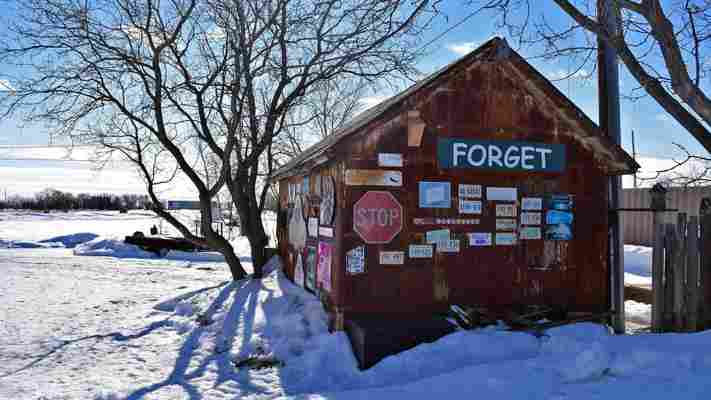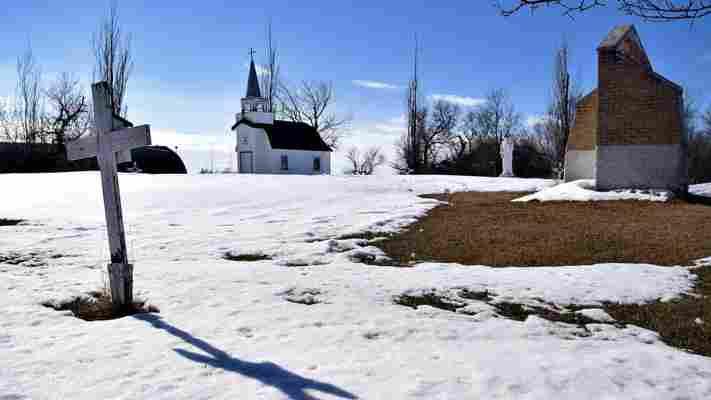The village that time may forget
Article continues below

Forget, Saskatchewan
Driving along Highway 13, it's easy to pass by Forget (pronounced ‘for-jay’) without much notice. With just one operating business, a church and some abandoned buildings, the tiny, two-block settlement in Saskatchewan’s south-eastern corner doesn't seem like much.
Miles of monochromatic farmland stretch in every direction, and the skeletons of maple, poplar and ash trees stand guard along the town’s border. A light dusting of snow carpets the ground and buries the prairie grass and caragana shrubs that protect the countryside from extreme windstorms. In the distance, drilling rigs are the only movement on the horizon.
Visitors know they have arrived when the asphalt road comes to an end about a mile down from the main highway. With a few clusters of homesteads and some withered red barns, Forget feels like a pastoral landscape passed over by time.
CORRECTION: A previous version of this story read that Forget, Saskatchewan, is located on Highway 15. This has been corrected to Highway 13.

Church in Forget, Saskatchewan
But not long ago, this rural village deep in prairie country was the epicentre of a vibrant religious and cultural scene.
Named after the first lieutenant governor of the province, Forget was settled in 1899 by group of French priests who arrived at the request of missionary coloniser Jean Isadore Faire to administer the local parish.
In 1905, they invited seven Catholic nuns to emigrate from France, and the nuns quickly took over much of the running of the parish. Canadian Pacific Railway had recently constructed a depot on the south side of town, and soon Forget became one of the region’s most thriving settlements. At its peak, there were three banks, two general stores and a hotel. There was even a newspaper. The nuns opened a school, built a rectory and saw the population balloon to more than 300.

Sunset, Forget, Saskatchewan
But when the railway stopped running through the region in the 1990s, residents fled to nearby cities and the town's numbers dwindled.
Forget, Saskatchewan, Main Street
Forget slowly sunk into obscurity. Today there are just 40 full-time residents, comprised of farmers, musicians and artists who are mostly self-reliant and appreciate a way of life that is void of modern conveniences.
There are no paved roads or infrastructure. Residents are responsible for supplying and hauling their own water and sewage, and if something needs repair, neighbours depend on one another to help fix whatever’s broken. Oftentimes, they barter and swap for things they need rather than drive 20 minutes to the nearby town of Stoughton to buy it.
The Happy Nun Cafe, Forget, Saskatchewan
Ten years ago, Forget was given a second chance when Shannon and Don Shakotko, who were living in the nearby town of Maryfield, saw in the local paper that the rectory was for sale. With a background in music, and a dream to create a community around it, they converted the derelict building into a concert hall and creative retreat for artists and musicians travelling across the province.
Soon after, the couple had expanded their vision with The Happy Nun Cafe , a restaurant focusing on locally sourced ingredients from nearby farms. In 2015, Chef Katie Vinge-Riddell bought the cafe and continued to make it a focal point of the village and region.
Katie Vinge-Riddell, The Happy Nun Cafe, Forget, Saskatchewan
Vinge-Riddell had been working as a chef in the province’s capital, Regina, as well as hosting a series of pop-up dinners around the city. But she longed for a place of her own where she could explore a food philosophy that told the story of her country.
When the Happy Nun went up for sale, friends and family urged her to make the journey out to the prairie because they knew it aligned with her values as a chef. As a child, Vinge-Riddell had driven by Forget many times on the way to her family’s cabin, but they never stopped.
“We thought, ‘Who would live there? What’s even there?’”
After her first visit to the cafe, Katie and her husband Riley Riddell knew it was meant to be.
“Honestly when I first saw it, I was like, ‘How did I not know about this place!’ she recalled.
The Happy Nun Cafe, Forget, Saskatchewan
The cafe’s name pays homage to the community’s French heritage and language, which at one point was the primary dialect spoken in the village.
Portraits of nuns hang inside the coatroom, and shelves filled with books line the perimeter of the large, communal dining area. Vintage relics of Forget’s history can also be discovered throughout, including the town’s original post office mailbox.
Pantry, The Happy Nun Cafe, Forget, Saskatchewan
Food on the prairie has a reputation for revolving around meat and potatoes, especially during the harsh winter months. So Vinge-Riddell started pickling local produce in autumn to be used throughout the year, and made her own bread and preserves. She also focused on showcasing the prairie’s best ingredients in dishes like rolled gnocchi with pureed Saskatoon berries, fresh peas and spinach, served with a brown butter sauce.
Dining room, The Happy Nun Cafe, Forget, Saskatchewan
It took a while for Vinge-Riddell to win over local diners, who were used to more conservative prairie food. But before long, after her cooking was featured on the local TV series The Prairie Diner and caught the attention of many food bloggers, the Happy Nun Cafe became a focal point of the village and a destination to celebrate birthday parties, anniversaries and wedding receptions.
“People are starting to trust me more and more. I’m bringing old farmers out of their shells,” Vinge-Riddell said.
Dinner, The Happy Nun Cafe, Forget, Saskatchewan
"I would say that it’s an elevated comfort food, and I really try to reflect the land and the prairies in the cuisine," Vinge-Riddell said.
Kitchen, The Happy Nun Cafe, Forget, Saskatchewan
Today, a typical dinner service sees between 60 and 70 guests over a three-hour period, arriving from all over the province and even some who plan road trips from the US to eat at the cafe. More people dine in one dinner service than live in the town of Forget.
Cows, Forget, Saskatchewan
"We once had a couple drive four hours one evening just to come for dinner. They didn't even spend the night in the area; they drove back after," Vinge-Riddell said.
Musicians, Forget, Saskatchewan
Word soon spread across the prairie that Forget was becoming a mecca for both food and music, and soon the town began hosting sell-out concert series and weekend festivals, putting the small town back on the map.
As the town’s musical credibility has grown, blues and country artists like the Bros. Landreth, Big Dave McClean and David Gogo commonly stop by to jam with whoever is around. Local band Caragana Ramblers (pictured: Dave Martell and Donna Shakotko), have gained national exposure because of their performances at the Nun.
“It kinda opened the door for us,” Martell said, who plays in the band with his sister and two other Forget residents. “It’s such a small venue and very warm in there; it just becomes your living room.”
Even if it's the only place in town, the Happy Nun Cafe brings the community together. And it may be the reason people don't forget it.
Since BBC Travel reported this story, Katie Vinge-Riddell tragically died in a car accident.
The Vinge family kindly gave BBC Travel permission to publish this story in memory of Katie. They have set up a scholarship fund at the Northern Alberta Institute of Technology, where Katie studied culinary arts, and are considering ways to keep the Happy Nun Cafe open. Katie’s younger sister Jillian, a chef herself, has expressed interest in cooking weekly meals in the spirit of her sister’s legacy. The family has also discussed inviting visiting chefs to come once a month to showcase their local dishes and keep the restaurant open as a music venue.
No matter what, the family hopes the tradition of The Happy Nun will live on and continue to be a place where the community comes together to experience good food and enjoy music. Two things Katie loved.

